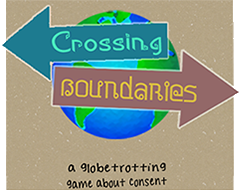
What is consent?
Consent has been in the news quite a lot over the past year or so. Unfortunately, one of the reasons that consent has been in the news is due to the failure of some people to understand - or to respect - this fundamental legal concept.
With every new incident involving consent it becomes more clear that many people, including some of those discussing it via the media, don't fully understand what is meant by consent. Further, rather than recognize the need for a conversation of what precisely is meant by consent these discussions have instead often become politicized. When well-intentioned (but incorrect) pundits mischaracterize the meaning of consent it only serves to further confuse people. Our hope is that this year's contest will help everybody have a greater understanding of - and appreciation for - consent.
Consent is a legal concept, not a political issue.
Consent is an important legal concept which affects all of us in a variety of ways. Although here we are focusing on the meaning of consent as it relates to relationships between people, consent also affects us in other ways. For example:
- medicine: informed consent helps a patient decide if they want to have elective surgery
- privacy: a driver can grant (or revoke) consent to the police to search their car for contraband
So, although for purposes of our game design challenge we are focusing on consent between people as it affects dating or sexual relationships, consent still has the same legal meaning in other contexts. What's great about this is that once you understand consent in our context you will be able to use that same knowledge in all contexts!
Let's start with a few dictionary definitions of consent:
- To give assent or approval (Merriam-Webster)
- Give permission for something to happen (Oxford)
So far this is straightforward ... but these definitions are fairly broad and open to interpretation. Let's move on to Black's Law Dictionary which provides a more precise definition:
- A concurrence of wills.
- Express consent is that directly given, either lira voce or in writing.
- Implied consent is that manifested by signs, actions, or facts, or by inaction or silence which raise a presumption that the consent has been given.
- Consent in an act of reason, accompanied with deliberation, the mind weighing as in a balance the good or evil on each side.
Well, this provides a great deal more detail about consent but it also invites a great deal of questions! One reason for any confusion is that the above legal definition contains words which have very specific legal meanings. These legal meanings might be different than the way we use those same words in everyday conversation.
Elements of Consent
We think it will be helpful to take the legal definition of consent and then break it down into its individual elements in order that everybody has the same understanding of what - precisely - is meant by consent. We believe that after evaluating each element of consent the true meaning of the word will become clear.
Consent is a very important and fundamental part of a healthy relationship; it involves giving permission and getting permission. More specifically, the permission is: informed; freely given; actively given; and revocable.
Informed
This requires that the person giving permission has a full appreciation of what the permission entails. For example, a person must be beyond a certain age to legally engage in sexual activity. The rationale for this is that while they are young, they aren't able to fully understand and appreciate the consequences of sexual activity.
Freely Given
This requires that the person giving permission does so free of coercion, intimidation, force, or threat. For example, an employee is not freely giving permission for their work supervisor to have sex with them if they are only doing so out of fear that they would otherwise lose their job.
Actively Given
This requires that the person giving permission actively communicates that permission verbally or through action. For example, an unconscious person cannot actively consent, nor can a person who is too drunk or otherwise incapacitated.
Revocable
This requires that the person giving permission is able to change their mind and revoke or change that permission whenever they so choose. For example, if a person engaged in any number of consensual activities with you last year that does not mean that the consent still exists when you bump into them at a pub with their new beau.
Consent Hypotheticals
Please note: the following hypotheticals, while not graphic, do describe non-consensual sexual assault.
Following are some hypothetical situations which allow us to see how the elements of consent can be used to determine if consent does - or does not - exist. Each of these hypotheticals are based on recent real-world news stories. Please note however that in order to present them in a way that is helpful for understanding consent we are presenting details which might not apply to the actual real-world events. These hypotheticals are intended only to help provide a real-world perspective, they are not intended to reframe or rewrite the actual events from which they are inspired. Also, most of these hypotheticals and the real-world events which inspired them are based on male-against-female situations. We realize that this is not always the case. Assault is never okay regardless of gender or sexual orientation.
One: Valium
Joe is at a bar with some friends when he sees an attractive girl. He buys her a drink and they get to know each other. After a few drinks Joe invites her to go to his place and she agrees. Once at his apartment Joe offers to make her another drink and she again agrees. She excuses herself to use his bathroom and while she is in the bathroom Joe slips valium into her drink. After returning to Joe and drinking the valium-laced drink, she starts to feel funny. Joe offers to help and takes her to his bedroom. Soon after she is unconscious. Joe proceeds to have sex with her.
Two: Drunk
Joe is at his first fraternity party in college. While returning to the party from using the bathroom, Joe sees a girl who is in his Writing course sitting on the bed in a friend’s bedroom at the fraternity house. He enters the bedroom and sees that although she's sitting upright her eyes are closed. He sits beside her on the bed and begins kissing and touching her. She opens her eyes and mumbles a few words. Her speech is slurred and Joe has no idea what she said. Joe continues to kiss and touch her.
Three: Grabbing
Joe is bragging to his buddies about his success with women. "I'm telling you guys - every girl I meet wants it." His buddies question if all women do indeed really want to have sex with Joe. To illustrate his point Joe exclaims that when he first meets a woman he's free to just "grab 'em by the pussy." Joe then goes on to say how these women often respond positively to his "grabbing" and claims that on occasion they even respond in kind.
Four: Teacher
Jo is a middle school teacher. In one of her classes Jo has a 6th grade student she had previously taught when he was in 2nd grade. They have a friendly relationship in class and sometimes she asks him to stay after class to chat. When she is alone with her student the friendly conversations become flirtatious. Although Jo's student is twelve years old she feels he is very mature for his age. Jo tells the student that she's attracted to him but that she knows that he's too young for them to become involved. The student tells Jo that he's attracted to her too - and that he's already sexually active. Jo explains to the student that they will have to keep their relationship a secret - and asks him if he is sure that he wants to date her. The student says he understands and knows what he is doing. Jo, a teacher in her thirties, begins a relationship with her twelve-year-old student.
Hypotheticals Discussion
Was it clear to you in each of these hypotheticals that consent did not exist - and why that is the case?
Valium - Joe did not receive consent to have sex. Consent requires, among other things, that permission be actively given. People cannot actively give consent while unconscious.
Drunk - Joe did not receive consent to engage in kissing or touching. Consent requires, among other things, that permission be actively given. People cannot actively give consent while too drunk or otherwise incapacitated.
Grabbing - Joe did not receive consent to grab anybody.
Consent requires, among other things, that permission be freely given and that permission is actively given.
This permission must be given prior to engaging in the behavior
- it cannot be requested afterwards.
(Please Note: after the fact one can only ask for forgiveness - not permission.)
Here, permission was not actively given as there is nothing to indicate through words or actions that
there was permission for Joe to grab anybody.
Also, if Joe grabbed somebody and they did not scream or run away that does not imply consent.
Consent requires that permission be freely given: free from intimidation, force, or threat.
Being grabbed without permission is intimidating, forceful, and threatening.
Teacher - Jo did not receive consent to begin a relationship with her student.
Consent requires, among other things, that permission be both informed and freely given.
For permission to be informed a person must be, among other things, old enough to appreciate the consequences of sexual activity.
The age of consent in the U.S. is determined by statute and varies from 16 to 18 years of age depending on the state.
Here, the student is only twelve and not legally capable of informed permission to agree to sexual activity.
Also, as the relationship between these two people is one of teacher and student, you must consider if permission was freely given.
Consent requires, among other things, that permission be freely given - free of coercion, intimidation, force, or threat.
In situations where one party has power over the other, determining consent becomes more complicated as it is can be difficult to
determine if that permission was indeed freely given or is only in deference to the difference in power
(e.g. giving permission only in order to avoid retribution; or giving permission only out of respect for the person in power).
Although it can sometimes be difficult to determine when the power imbalance is too great for permission to be freely given,
here the power imbalance between a 6th grade student and his teacher is too great to support an argument that permission was given freely.
Again, these hypotheticals are intended to encourage you to think about how the issue of consent applies in real-world situations. They are also intended to highlight the importance of understanding consent. In these hypotheticals, if Joe (or Jo) genuinely believes they've done nothing wrong and has acted out of ignorance . . . so what? Ignorance will not change the reality of sexual assault for Joe's (or Jo's) victims nor will it allow Joe (or Jo) to escape the legal ramifications.
Ignorance might help explain bad behavior but it does not excuse it.
Consent Resources
Here are a variety of resources which you might find helpful. These are resources created by other groups or individuals and we are not responsible for their content. The resources will likely provide much greater information about consent than we've covered here - and that's our hope. We want you to have a nuanced understanding of consent.





